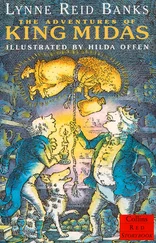Glyn Iliffe - King of Ithaca (Adventures of Odysseus)
Здесь есть возможность читать онлайн «Glyn Iliffe - King of Ithaca (Adventures of Odysseus)» весь текст электронной книги совершенно бесплатно (целиком полную версию без сокращений). В некоторых случаях можно слушать аудио, скачать через торрент в формате fb2 и присутствует краткое содержание. Год выпуска: 2009, ISBN: 2009, Издательство: Macmillan Publishers UK, Жанр: Старинная литература, на английском языке. Описание произведения, (предисловие) а так же отзывы посетителей доступны на портале библиотеки ЛибКат.
- Название:King of Ithaca (Adventures of Odysseus)
- Автор:
- Издательство:Macmillan Publishers UK
- Жанр:
- Год:2009
- ISBN:9780230744486
- Рейтинг книги:3 / 5. Голосов: 1
-
Избранное:Добавить в избранное
- Отзывы:
-
Ваша оценка:
- 60
- 1
- 2
- 3
- 4
- 5
King of Ithaca (Adventures of Odysseus): краткое содержание, описание и аннотация
Предлагаем к чтению аннотацию, описание, краткое содержание или предисловие (зависит от того, что написал сам автор книги «King of Ithaca (Adventures of Odysseus)»). Если вы не нашли необходимую информацию о книге — напишите в комментариях, мы постараемся отыскать её.
King of Ithaca (Adventures of Odysseus) — читать онлайн бесплатно полную книгу (весь текст) целиком
Ниже представлен текст книги, разбитый по страницам. Система сохранения места последней прочитанной страницы, позволяет с удобством читать онлайн бесплатно книгу «King of Ithaca (Adventures of Odysseus)», без необходимости каждый раз заново искать на чём Вы остановились. Поставьте закладку, и сможете в любой момент перейти на страницу, на которой закончили чтение.
Интервал:
Закладка:
‘Athena! Goddess, come to me.’
‘What do you want, Odysseus?’ said an invisible voice.
The prince squinted against the darkness of the temple but saw nothing. Then he noticed that a faint light outlined the crudely shaped effigy of the goddess. Its features were no different, but as he looked he could see a glimmer from its black eyes. Immediately he bowed his head and whispered her name.
‘Why have you called me?’ she said. ‘I can’t see any enemies – at least not living ones – and you haven’t even reached Ithaca yet! Weren’t you going to call me when you returned home?’
Odysseus lifted his head and looked directly at the clay figure.
‘That was my intention, Mistress, but circumstances have changed. I have wits and courage enough to defeat my enemies on Ithaca, and yet there’s one thing that’s beyond any mortal. Only a god can give a man back his life.’
He gathered up Eperitus’s corpse into his muscular arms and held it towards the statuette. Eperitus watched with a deep sense of pity in his heart: even Athena would not restore life to a dead mortal, and so Odysseus had thrown away his last hope of saving Ithaca. He heard Athena’s voice admonishing Odysseus, telling him that what he asked was an insult to the gods, a request no man had any right to make of an immortal.
But, she added, she was compelled to honour her word.
Eperitus turned to Hermes, ready to be taken under his black cloak, but the god now stood at the threshold of the temple. His cloak was open and in the dark shadows of its folds was the quaking ghost of Damastor. His mouth was open in a soundless groan and his insubstantial arms were stretched out towards him, imploring his help. But there was nothing Eperitus could do, even if he wanted to, and a moment later Hermes had taken him on his final journey. He heard again the sound of rushing air outside, this time receding and accompanied by a low, despairing wail.
Suddenly he felt heavy. His ethereal limbs were seized by an awful lethargy that pulled upon them with irresistible force, dragging him downwards. The sensation consumed his whole body, constricting and crushing it so that he felt himself slowly being sucked into the ground at his feet. Then Eperitus felt a mighty blow knock him to the ground. It plunged him into a spinning blackness where he fell but did not hit the floor. Instead he tumbled downwards, his disembodied senses reeling about him like tentacles, reaching out to clutch at anything that might offer itself in that sensory void. As a wraith, he had at least been granted a grey sort of vision and a dull consciousness of sound; his other senses had been dimly aware of the living world from which they were departing, as if his body was still tenuously attached to it or had been gifted a final memory of mortal experience before being doomed to the Underworld. But in this non-existence the cord had been cut and he knew the true, hopeless meaning of death. For a fraction of worldly time he was held in an eternity of nothingness. It could not be measured, for he did not even have the comfort of his own thoughts with which to fill the vacuum. The only thing Eperitus knew for sure was that he had been given a glimpse of the pit into which all souls must one day be cast. And it was utterly black.
Something snapped. He felt himself in Odysseus’s arms and everything was perfectly still. Then he lurched violently upwards as his lungs screamed for air. Simultaneously his heart quivered in his chest and began to spasm into action. Every organ of his body burst back into the unrelenting fight that gives life. His eyes opened and the brightness in the unlit temple was almost blinding.
Odysseus stared back down at him, his eyes wide with shock. Then he turned his attention to the gash in Eperitus’s tunic and began probing it with his fingers.
‘It’s gone,’ he declared, disbelief and joy alternating upon his features. ‘The wound’s gone. You’re healed!’
‘He’s more than healed,’ Athena corrected. ‘How do you feel, Eperitus?’
Eperitus placed tentative fingertips upon the place where he had been stabbed. Not even the trace of a scar was left to mark the spot. He attempted to sit up and although his limbs and torso still felt heavy there was absolutely no pain. He raised himself stiffly to his feet, anxiously anticipating a stab of searing pain or a gush of blood from the reopened wound. Yet nothing happened. His wound was healed; he had been restored to life.
Eperitus looked at the goddess, wanting to express his gratitude but stalled by the inhuman form she had assumed. Instead he turned to his friend, whose sacrifice had saved him.
‘I feel wonderful. The pain has gone. I mean, it’s gone entirely.’
‘Anything else?’ Athena asked.
‘Yes. I feel as if I’ve been given a new body. There’s no pain in my chest, or anywhere else either. The throb in my shin where I was hit by a spear on Mount Parnassus has gone; even the ache in my ribs from the beating at Sparta. I feel wonderful!’
‘You’ll soon learn that your hearing has improved too,’ the goddess added, ‘and your eyesight and sense of smell. Your whole body has been rejuvenated.’
Despite the joy of his new body, Eperitus remembered he was in the presence of a goddess and knelt before her. As he did so he placed the soft part of his knee onto a sharp pebble and called out in pain. The statuette laughed with a grating sound that reminded him of stones being rubbed together.
‘You may have a renewed body cured of all past wounds, Eperitus, but you aren’t immune to future hurt. Even we Olympians feel pain when we assume earthly form. But now you must both return to your comrades, who are already looking for you. Tomorrow you will sail for Ithaca, Odysseus, to find your destiny. There you’ll meet the greatest trial of your strength and intelligence so far, especially as you can’t now rely on my help.’
With that the glimmer in the effigy’s eyes died and the darkness in the temple grew deeper. A lonely wind whistled through the branches of the dead tree outside, and they knew that the goddess was gone.
Chapter Twenty-seven
THE RETURN
Ships were easy to find when they reached the coast at dawn of the next day, and Odysseus had soon hired two merchantmen and their crews for the return to Ithaca. Eperitus was the last to board, and as he walked up the gangplank onto the unsteady craft there was a murmur of excitement amongst the Ithacans. They were going home at last and their conversation was full of the sights and sounds of their island, mixed cautiously with memories of family and friends. But they had also regained the sense of purpose that had been denied them in Sparta. As guests of Tyndareus they had been a burden, vagrant soldiers given temporary lodgings for the sake of their master. There, only Odysseus was of any importance and only he could influence their collective destiny. Now they were returning to fight for everything they held dear, and each man would be vital in the coming battle. On Ithaca, for better or worse, they would come into their own again as their spears and swords challenged the usurpers for the right to rule.
Neither Eperitus nor Odysseus told them about the supernatural events of the previous night. All they revealed on their return was that Damastor had shown himself to be a traitor by attempting to kill Odysseus, for which he had paid with his life. If Odysseus spoke with Penelope about it he did not tell Eperitus, and for his own part Eperitus did not share with Odysseus the fact that Clytaemnestra had warned him about Damastor.
Even between themselves, they had exchanged few words about the incident. Eperitus had thanked Odysseus in the straightforward manner of a soldier, and Odysseus had accepted his words of gratitude with a simple nod. The fact that he had sacrificed his best hope of regaining his homeland was not mentioned by either man, and they now turned their minds to the challenge that lay ahead. But both men knew that the bond between them had deepened. Each had saved the life of the other, and warriors do not forget such matters, even if they do not talk about them.
Читать дальшеИнтервал:
Закладка:
Похожие книги на «King of Ithaca (Adventures of Odysseus)»
Представляем Вашему вниманию похожие книги на «King of Ithaca (Adventures of Odysseus)» списком для выбора. Мы отобрали схожую по названию и смыслу литературу в надежде предоставить читателям больше вариантов отыскать новые, интересные, ещё непрочитанные произведения.
Обсуждение, отзывы о книге «King of Ithaca (Adventures of Odysseus)» и просто собственные мнения читателей. Оставьте ваши комментарии, напишите, что Вы думаете о произведении, его смысле или главных героях. Укажите что конкретно понравилось, а что нет, и почему Вы так считаете.










